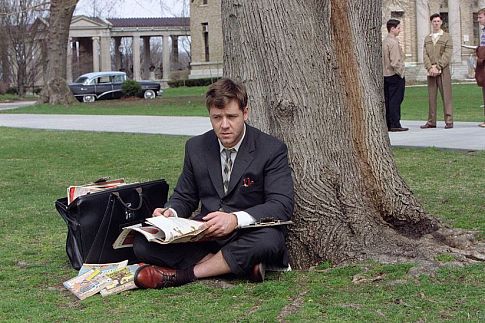The life of a mathematician is not inherently cinematic. In between all of the major accomplishments, thousands of individuals, both in academia and industry, try to make small progress on big problems. John Nash is an exception for two reasons. First he made huge advances in math and economics from applying fairly simple ideas (like taking anyway any incentive to cheat) to bargaining situations. For this, he was awarded the Nobel Prize for Economics in 1994. Second was that he was a diagnosed schizophrenic. Scientists have long pondered some connection between the two. Clearly not all brilliant people are insane, but are they more likely to be? Not sure there's an answer for that question.
When the story begin, Nash is starting a graduate program at Princeton. He's reclusive and obnoxious, alienating fellow students and frustrating professors. He's not interested in the minutiae of classes and publishing results he considers trivial. He wants one big idea to stand out from the crowd and he's willing to risk everything to find it. He's starting to lose his grip on reality, but with no one to confide in he can't see the signs. When his big idea comes through, he is able to land his dream job and he seems to be on good terms with his colleagues.
Quick note about the scene at the bar. What Nash describes is not a Nash equilibrium. That involves everyone having no reason to change his or her behavior alone. If each of the Nash's friends went for each of the blonde's (she was never given a name) friends, then any one of them would potentially benefit from switching. However, I don't think that was Nash's intention here. I think he was just identifying the individual benefit of the friends staying out of each other's way. That's my dork moment. Now back to the movie.
A few years down the road, Nash is unhappy to discover his job now involves teaching. He wanders in the room on the first class and promptly insults the students (not unusual for the time), resigned to "Here we are." One of the few female students, Alicia sees past his hostility and gets close to him. This presents another challenge and he had considered relations with women just another problem, and one he couldn't solve at that. She sees the humanity in him and he finally lets her in, although not sharing the darker parts of his life.
His illness gets worse and his colleagues can no longer overlook his behavior as quirky. Even the slightest brushback causes Nash extreme paranoia and soon he is considered a danger. He is involuntarily (and quite dramatically) committed and soon treatments are performed to try to hit his "reset" button. While the insulin shock treatments were standard for schizophrenia at the time, they are still horrifying to watch. When he is finally released and put on heavy medication, his work grinds to a halt. He is also not able to do much more than smoke and stare into space, which puts a tremendous strain on Alicia. Nash decides that his current life is no improvement and whether there are other paths available.
Alicia makes the remarkable decision not just to delay his re-commitment, but to stay in the house when he could potentially hurt her. Her belief that he can do this is expressed in the film's strongest scene. Nash summons all of his strength and shows up at Princeton. His acclimation to the new environment is slow, but his colleagues are supportive and eventually he finds comfort as a professor. The last few scenes of the movie involve him getting the recognition he had wanted for so long. The ceremonies border on cloying but they're not very long and helps the movie to end on the right note. And as expected, there are titles at the end to explain what the couple was doing at the release of film. Time doesn't stand still, though. John and Alicia Nash died in a taxi accident in 2015.
Movies that win the Academy Award for Best Picture often face backlash as do films that are based on real life. I don't feel the Oscar backlash is deserved, as A Beautiful Mind was by far the best of the five nominees that year. (Although I'd never convince at LOTR fan of that.) As for the changes in Nash's story... that's a valid criticism. I won't list all of the differences here as the list is easy to find. Still, we need more movies about mental illness and the options available. And that regard, this film provides a public service.
